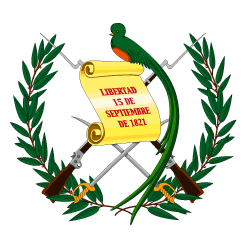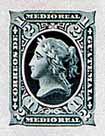
Pedro
de Alvarado arrived in Guatemala in 1523 and the new territory was integrated
in
the Vice Kingdom of NUEVA ESPANA. In 1821, after the independence from
the
Spanish Crown, Guatemala was a part of Mexico.
In
1839 the State of Guatemala has been created
and
in 1847 finally the Republic of Guatemala was established.
The
collection comprises stampless covers, the first four issues of Guatemala
and incoming mail.
Stampless
covers with 10 difficult Spanish colonial period marks including the patriotic
of
king Fernando VII during the french occupation of Spain, and 14 republican
ones.
A
The
exhibit includes a fine array
of
proof material with the original
projected
die initialed by the engraver
plus
other dies, trial and plate proofs.
Consisting
of four values; 1c, 5c, 10c
and
20c, the currency in "centavos".
The
stamps were printed by the Government Mint, Paris.
The
issued stamps represented
with
the 1c in a block of 150, the 5c tete-beche varieties including
a
block of 6 with a tete-beche,
|
1871
COAT OF ARMS
First
Issue

the
largest known used block
of
the 20c and the only known
sheet
of the 20c value.
|
The
1871 Coat of Arms issue also
include
a fine array of imperforates.
The
cover section include several
unique
and rare frankings like the
three
known 6c rate covers, the 12c
rate
to Mexico, the 1c strip of 5 used
internally
and the 10c bisect.
Two
celebrated covers in this section
are
the 20c block of 5 to England, the largest known franking and the
20c
error of color on cover.
|

1873
COAT OF ARMS
Second
Issue
Two
values, the 4r and 1p,
the
currency reverting to "reales".
They
were lithographed by
Edward
Matthews in London.
There
are no known blocks of this
issue
and the largest known multiple
of
either value is a pair.
The
unique used pair of the 1p is shown while the covers include one sent to
Acapulco, one with a pair of the 4r
and
one with the very rare
1
peso on cover.
A
|

|

1875
LIBERTY HEAD
Third
Issue
The
Allegory, consisting of four values, 1/4r, 1/2., 1r and 2r.
These
were printed by the Columbian Bank Note Company, New York.
The
exhibit includes a very rare die proof, mint multiples and usages of the
1/2r,
one
of the two known 1/2r complete
sheet
of 100, the only known 1r
complete
sheet of 100, a very rare
mix
franking of two issues on cover
sent
to Paris and 2r values
on
cover including
a
4r rate to Paris.
A
|
Consisting
of four values: 1/2r, 2r
4r
and 1p. These were printed by
A.
Chaix and Co. Paris.
The
exhibit includes the wonderful
original
drawing for the design,
a
wide range of master dies in various colours as well as finished die proofs,
plate proofs and trials.
The
issued stamps have the well
known
imprint blocks, the 1p sheet
and
imperforate pairs between,
plus
the only known
2r
and 4r complete sheets of 100.
|
1878
"INDIAN HEAD"
Fourth
Issue

|
The
covers show internal usages with single 1/2r and double 1/2r franking,
a
1/2r envelope to London with seven added 1/2r stamps, overseas covers
with
various 2r, 4r and 1p franking.
The
unique 4r bisect and a pair of 1p values on cover, the famous mixed
issue
franking cover with the 1r of the following "Quetzal" issue and the
part
cover showing a 2r used in combination with a 1/- value from neighboring
British Honduras.
|

|
: Images
reproduced from colored xerox copy of the collection.
|



